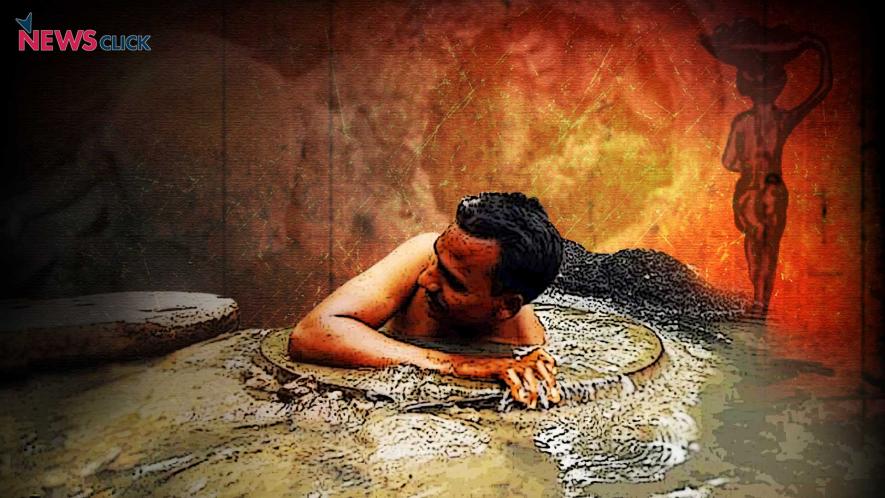No end to Manual Scavenging: 3 More Die in Kanpur While Cleaning Septic Tank

Lucknow: Even after years of being formally banned in the country, manual scavenging continues to claim the lives of sanitation workers in Uttar Pradesh. In a recent incident, three labourers, including a minor, breathed their last after they entered a newly-constructed septic tank through a manhole. The three persons had stepped into the tank to remove the shuttering from inside.
Victims Sent to Remove Shuttering
The deceased were identified as Nandu, 18, his elder brother Mohit, 24, and their neighbour Sahil, 16; all residents of Chaubepur in Kanpur. They did not have any safety gear when entering the septic tank. Police said they would file a case against the house owner, who is now absconding.
Speaking to NewsClick, Kanpur DCP, West, Vijay Dhull said, “Three sanitation workers who had gone to the Bithoor area to remove the shuttering from an unused septic tank built a few months ago died after inhaling toxic fumes. The Kanpur Fire Department recovered them; they were sent to Hallett Hospital but were declared dead on arrival yesterday.”
Dhull further said, “Sahil stepped into the tank first and lost consciousness. Nandu and Mohit tried to rescue him, but they also met the same fate. The three may have died of suffocation.”
The police assured that action would be taken if the deaths were caused due to negligence.
The DCP said Nandu and Mohit used to undertake shuttering work of septic tanks, and Sahil was their labourer. A case will be registered in the matter if the victims’ families wish to file a complaint, Dhull said.
Meanwhile, the families of the deceased alleged murder and demanded action against Bheem Singh.
Sanitation Workers' Deaths in UP
The incident is a near-repeat of the three sanitation workers’ deaths at a house construction site in Barra, in Malviya Bihar of Uttar Pradesh’s Kanpur district on September 19. On that day, one worker who had entered the septic tank died after inhaling hazardous fumes and two others died trying to rescue him. They were also not equipped with any protective gear.
In similar circumstances, after one of the workers entered the tank and fell unconscious, another went inside to save him but also lost consciousness. Finally, the third one entered the tank to save his co-workers but met the same fate—all three ended up suffocating to death.
In May, two sanitation workers died of suffocation after entering manholes in separate incidents in UP. Two months later, in July, two brothers died after allegedly inhaling toxic gases while cleaning the tank of a sewage treatment plant at Awas Vikas Colony, Kushinagar. The duo was hired by a local Bharatiya Janata Party (BJP) leader and forced to clean the tank without any safety equipment.
In 2019, five sanitation workers died while cleaning a sewer tank in Ghaziabad.
According to data collected by the National Commission for Safai Karamcharis, an organisation under the Union Ministry of Social Justice and Empowerment, 989 workers died while cleaning sewers and septic tanks in the country in the last twenty years. From 1993 to February 2022, Tamil Nadu had the highest number of deaths at 218 during sewer cleaning. Gujarat witnessed 153 deaths, while 97 deaths were reported in Delhi. As many as 107 sanitation workers died in UP, 84 in Haryana and 86 in Karnataka. The cause of every such death is said to be poisonous sewer gas.
Ramesh Gautam, an activist and member of the National Commission for Safai Karamcharis, told NewsClick that despite growing incidents of workers dying while cleaning septic tanks, the government has not been paying adequate attention even to collecting reliable and updated national-level data on this important issue.
“The nature of the work, especially for sewerage line cleaners, is extremely dangerous. Which developed country tolerates this kind of human indignity? Surely the government can do with putting money in machines to clean sewers rather than watch people die in gutters,” Gautam said.
Manual scavenging is outlawed in India, but it is still widely practised, especially in the unregulated private sector. The workers, most of whom belong to disadvantaged, socio-economically marginalised communities, are often hired by private contractors who do not provide safety gear and machines for scientifically cleaning sewage tanks.
Get the latest reports & analysis with people's perspective on Protests, movements & deep analytical videos, discussions of the current affairs in your Telegram app. Subscribe to NewsClick's Telegram channel & get Real-Time updates on stories, as they get published on our website.
























